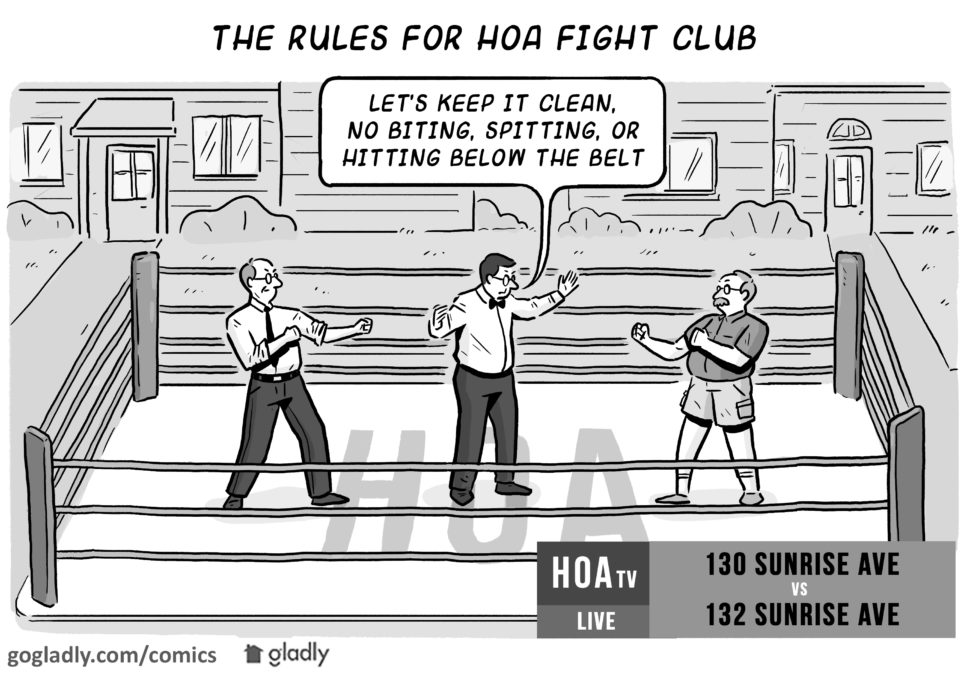If you’ve lived on planet earth for very long you’ve probably had a problem with a neighbor.
Neighbor vs neighbor disputes aren’t new, and they definitely aren’t unique to homeowner associations, but, when these confrontations arise in a common interest community, the HOA can get stuck in the middle. In many cases, it’s difficult to determine when, or if, the HOA should get involved.
You’ve probably heard the stories or even experienced it yourself. The disagreement among neighbors that blows up into a full-blown battle involving lawyers, security cameras and of course the lawn sign proclaiming to the world what a terrible neighbor lives next door. In some of these cases, it seems that one or both parties are so bent on winning the argument or making their neighbor suffer, that they really have no interest in finding a reasonable solution.
Neighbor disputes often involve issues like noise, pets, boundaries, fences, unkept property, just to name a few. And just like the Hatfields and McCoys, a simple argument over a pig can result in years of pointless battles. But, should the HOA be required to mediate when neighbors fail to get along?
There’s a Policy for That
The level of involvement with neighbor disputes will be different for every community, depending on their rules and policies in the governing documents. Many rules, such as nuisance or noise, have no clear threshold between what is acceptable and what is a violation. In situations like this, it is best if neighbors can work out the problem together, in a spirit of cooperation and neighborly consideration. (No. Really. I’ve heard it can work.) But if it doesn’t, the HOA should have a policy to help the board of directors and the individuals involved, navigate these difficult disputes.
Over the years, I have been witness to several situations where owners approach the HOA to solve a problem they have with their neighbor. Often they have done little or nothing to try to resolve the issue on their own, usually, because they are afraid of having an uncomfortable conversation with the neighbor. When the neighbor is confronted with the issue, the stories usually don’t match up and it quickly becomes a situation of He-said, she-said with no clear resolution in sight.
The board of directors has plenty of things to occupy their time. Too often that time is monopolized by petty disputes or other issues that could be resolved outside the realm of the HOA. And let’s face it, there are probably more important issues the board should focus on. By providing a guide for resolving neighbor disputes you can help the members understand the role of the HOA. And more importantly, they will understand their responsibility in resolving these disputes.
What it Is and What it Isn’t
Let’s start with what this policy isn’t. First, it’s not a way for the HOA to get out of dealing with violations of the CC&Rs. The board has a clear responsibility to deal with CC&R violations consistently and fairly.
Now, onto what this policy should include:
- It is created with the help of a qualified HOA attorney.
- It places the responsibility to resolve the dispute first on the neighbors involved. The HOA only gets involved after the homeowner has taken the required steps.
- It defines if and/or when the HOA should get involved.
- It establishes a threshold of proof or evidence before the HOA gets involved.
- It outlines a process to follow in order to resolve the issue.
In short, the dispute resolution policy requires unreasonable people to take reasonable steps to resolve problems with their neighbors. The HOA may eventually need to act as the judge and jury but only after the reasonable options have failed to resolve the problem.
- Liar, Liar, Pants on Fire! Handling Misinformation in Your HOA - March 13, 2019
- Setting the Ground Rules for Neighbor Disputes - June 27, 2018
- HOA Board Responsibilities – It’s Not as Difficult as You’re Making It. - April 23, 2018



 Help
Help
Good article. Thank you. I’ve shared some of your postings with my board.
A format question., Did you intend to use a grey font on an off white background?
I call it the baseball rule; if 3 people are complaining, you’re out. Otherwise, it’s a neighbor v. neighbor issue. Watch here:
https://www.youtube.com/watch?v=yp8pCS4nLDY&t=50s
Thanks, Bob that is an excellent explanation.